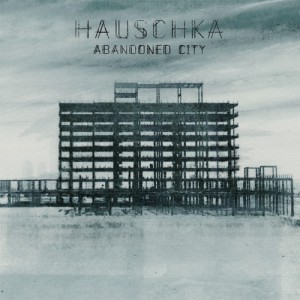Last year, Volker Bertelmann (more commonly known as Hauschka) played a show at the Bristol Proms, a series of concerts designed to demonstrate to classical music audiences young and old that classical music was not dead, merely presented in the wrong way. With his prepared piano the only object on stage in The Bristol Old Vic, stuffed with toys and wires and other rattly paraphernalia, he showed that classical music audience that he wasn’t really a classical music artist in the first place. Not that he should be, per se, but it’s an example of the decidedly wobbly lines that Hauschka’s music is still straddling, ten albums in. Abandoned City is, therefore, an uneasy synthesis of introspection, that Rick Szalinski-esque basement-bound experimentation and the occasional genuine lunge at an actual melody.
Loosely conceived as a tour of deserted metropoles (each track has the name of a different existing city, with the exception of ‘Elizabeth Bay’ and ‘Who Lived Here?’), the album’s greatest strength is in conjuring up the image of its subjects. At the risk of demeaning the music as mere painting by numbers, when Hauschka calls a track ‘Thames Town’, it really does sound like something you’d hear as you meandered, paranoid, around the place itself, an architecturally bizarre approximation of English market towns in China. Similarly, ‘Agdam’ rattles with the gunfire and spent ammunition that rendered the Azerbaijani town of its title derelict in the 1993 Nagorno-Karabakh War.
When the melodic sunshine does poke through, though, it’s a welcome recompense for all the effort spent on discerning tunes amid all the quivering experimentation and pitch-shifting pianos. ‘Who Lived Here?’ is such a moment, despite feeling slightly televisually mournful, and ‘Craco’ has its feet directly planted in the Ludovico Einaudi camp of accessibility. The strangely riffy ‘Sanzhi Pod City’ has a bassline that’s cousins with ‘Ruby’ by the Kaiser Chiefs, but with an omnipresent tittering in the background refusing to die down. The point being with all of these examples is that there are clearly efforts being made to make the record sound nice rather than just interesting.
Hauschka’s sound is becoming increasingly palatable to softer ears, despite or perhaps because of a recent valorisation by the core classical community. The fact that rhythms are more intentionally poppy and the prevalence of what sound like synthesisers on certain tracks (with his devil’s box of a prepared piano, you can’t be sure) suggests that he is heading towards a middle ground that could be enjoyed by both core-classical and indie noodling camps. But what it doesn’t do is make a strong decision about either. Consequently, moments of head-nod acceptance are short-lived and tempered by the strong and perfectly natural desire to twit about, the result being an always-involving but never quite satisfying listen.
It’s perhaps clearest in Abandoned City‘s closing track, ‘Stromness’, which serves both as a wander around the titular Orkney town and as a tip of the cap to Peter Maxwell Davies’ piece ‘Farewell To Stromness’, sharing its simple pacing and plaintive disposition. It’s accessible for the first half, but when it accelerates the focus is lost, attempting to take the casual listener and sieve out their idea of what prettiness might be, but only partially succeeding. On the plus side, when you listen closely to Abandoned City it’s a pure aural experience. The detail is wonderful, ghostly and rich, but the whole would have benefited from a clearer, less meandering navigator.


